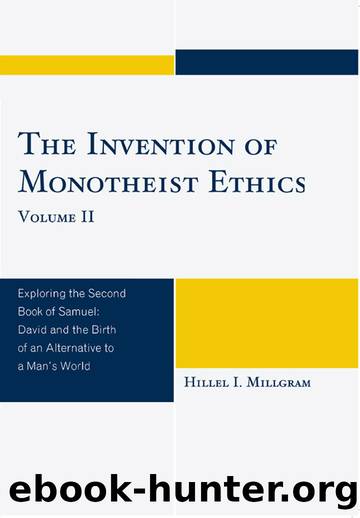The Invention of Monotheist Ethics by Millgram Hillel I

Author:Millgram, Hillel I.
Language: eng
Format: epub
ISBN: 9780761849254
Publisher: University Press of America
Published: 2010-08-15T00:00:00+00:00
1. See Chapter 23.
2. See Chapter 24.
3. See Chapter 25.
4. See Chapter 24.
5. See Chapter 25, especially note 67.
6. Another matter occupying the king at this time was the long-term project to increasingly professionalize the army. This involved enlarging the size of the regular army and the contingents of foreign mercenaries, and the building of a chariot corps. This may have been, in part, a response to the growing unrest in Israelâs population that made the reserve forces increasingly unreliable. On the one hand this professionalization removed the burden of periodic military service from the public (though this was probably replaced by periods of unpaid laborâthe levy or corveeâmore on this later). On the other hand, it was preparing the tool that would enable Davidâs successor to ruthlessly oppress the population and to crush any public unrest. See Chapter 25, especially note 18.
7. There may have been other projects of which we know nothing.
8. One important purpose of taking capital cases out of local hands was to stamp out the deeply embedded tradition of blood feuds. In this the reform ultimately proved successful, but only after the passage of many generations. The institution of âThe Redeemer of the Bloodâ was only relegated to the realm of a historic memory towards the end of the first Commonwealth.
9. This is based on Solomonâs administrative districts. My assumption is that the first stages of this reorganization originated in Davidâs time, and that Solomon simply brought the process to its conclusion.
10. This administrative reorganization was never applied to the Kingdom of Judah, only to the Kingdom of Israel. Was this discrimination in favor of Judah, not disturbing the status quo, due to favoritism shown to Davidâs home tribe, or to the danger of explosive resistance, or simply to the fact that Judah, a mini-kingdom comprising a single tribe, was too poor and sparsely populated to be worth the effort? We do not know.
11. The dire warnings of the prophet Samuel, as to the price the population would pay for their demand for a king, were now being fulfilled (see Chapter 5). It may be that the author secretly sympathized with Samuelâs anti-monarchic views: perhaps that is why she gave them such prominent treatment. In a sense, all of 2 Samuel is a description of the working out of Samuelâs grim foresight into how things would develop.
12. See Chapter 25: âThe Economic Consequences of Empire.â
13. Reading with Q; MT reads Absalom provided him self with.
14. The runners served several purposes: they cleared a way for the chariot through the narrow and crowded streets of ancient cities, they acted as bodyguards and they displayed the exalted rank of the man who rode in the chariot. Egyptian pictures show some of the runners as being armed with clubs, possibly to beat pedestrians out of the way when necessary.
15. The writer of the Book of Kings, in a very similar situation, underlines Davidâs permissive attitude with a heavy hand, inserting the remark: Now his father had never restrained him in his entire life by saying: âWhy have you done this?â (1 Kings 1:6).
Download
This site does not store any files on its server. We only index and link to content provided by other sites. Please contact the content providers to delete copyright contents if any and email us, we'll remove relevant links or contents immediately.
Phoenicians among Others: Why Migrants Mattered in the Ancient Mediterranean by Denise Demetriou(583)
Verus Israel: Study of the Relations Between Christians and Jews in the Roman Empire, AD 135-425 by Marcel Simon(579)
Caesar Rules: The Emperor in the Changing Roman World (c. 50 BC â AD 565) by Olivier Hekster(561)
american english file 1 student book 3rd edition by Unknown(542)
Europe, Strategy and Armed Forces by Sven Biscop Jo Coelmont(508)
Basic japanese A grammar and workbook by Unknown(506)
Give Me Liberty, Seventh Edition by Foner Eric & DuVal Kathleen & McGirr Lisa(472)
Banned in the U.S.A. : A Reference Guide to Book Censorship in Schools and Public Libraries by Herbert N. Foerstel(471)
The Roman World 44 BC-AD 180 by Martin Goodman(465)
Reading Colonial Japan by Mason Michele;Lee Helen;(461)
DS001-THE MAN OF BRONZE by J.R.A(455)
The Dangerous Life and Ideas of Diogenes the Cynic by Jean-Manuel Roubineau(444)
Introducing Christian Ethics by Samuel Wells and Ben Quash with Rebekah Eklund(441)
Imperial Rome AD 193 - 284 by Ando Clifford(436)
The Oxford History of World War II by Richard Overy(436)
Literary Mathematics by Michael Gavin;(400)
Catiline by Henrik Ibsen--Delphi Classics (Illustrated) by Henrik Ibsen(393)
Language Hacking Mandarin by Benny Lewis & Dr. Licheng Gu(388)
How to Reach the 9.0 in IELTS Academic Reading by IELTS Medical(363)
